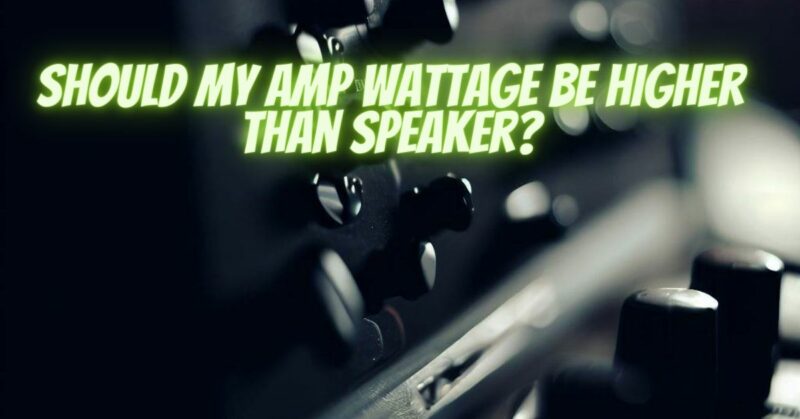When choosing an amplifier and speakers for your audio system, it is important to consider the wattage of each component. Wattage is a measure of how much power an amplifier can output, and it is important that the amplifier be able to provide enough power to drive the speakers without distorting the sound.
So, should your amp wattage be higher than your speaker? The answer is yes, but it is not as simple as a one-to-one ratio. There are a number of factors that you need to consider when matching your amp and speakers, including the size of the room you will be using, the type of music you will be listening to, and your personal preferences.
How Wattage Affects Sound
The amount of wattage an amplifier can output has a direct impact on the sound quality of the speakers. A higher wattage amplifier will be able to produce more sound pressure level (SPL), which means that the speakers will be able to get louder. This is important if you plan on listening to your music at high volumes or if you plan on using your system in a large room.
However, too much wattage can also be a bad thing. If the amplifier is too powerful for the speakers, it can cause the speakers to distort. This means that the sound will become muddy and unclear.
Matching Amp and Speaker Wattage
The best way to match your amp and speaker wattage is to consult the specifications for both components. The specifications will tell you the maximum wattage that the speakers can handle. You should then choose an amplifier that has a wattage rating that is at least twice the maximum wattage of the speakers.
For example, if you have speakers that have a maximum wattage of 100 watts, you should choose an amplifier that has a wattage rating of at least 200 watts. This will ensure that the amplifier has enough power to drive the speakers without distorting the sound.
Other Factors to Consider
In addition to wattage, there are a few other factors that you need to consider when matching your amp and speakers. These include the impedance of the speakers, the sensitivity of the speakers, and the type of music you will be listening to.
The impedance of the speakers is a measure of how much resistance they offer to the flow of electricity. The impedance of the speakers should match the impedance of the amplifier. If the impedance is not matched, it can cause the sound to become distorted.
The sensitivity of the speakers is a measure of how loud they will be when they are driven by a certain amount of power. The speakers with higher sensitivity will be louder than speakers with lower sensitivity.
The type of music you will be listening to will also affect the wattage requirements of your amp and speakers. If you plan on listening to a lot of loud, bass-heavy music, you will need a more powerful amp and speakers than if you plan on listening to a lot of soft, acoustic music.
So, should your amp wattage be higher than your speaker? The answer is yes, but it is not as simple as a one-to-one ratio. You need to consider the size of the room you will be using, the type of music you will be listening to, and your personal preferences. By matching your amp and speakers correctly, you can ensure that you get the best possible sound quality.
Additional Tips
- If you are not sure how to match your amp and speakers, it is always best to consult with a professional.
- When you are buying an amplifier, it is a good idea to buy one that has a wattage rating that is more than you need. This will give you some headroom in case you decide to upgrade your speakers in the future.
- If you are buying speakers, it is a good idea to buy ones that have a high sensitivity rating. This will ensure that they get loud enough even if you are using a lower wattage amplifier.


